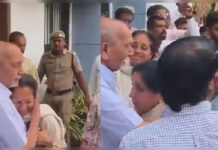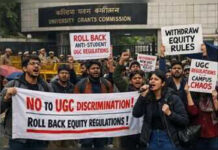Tensions flared in Dharavi, Mumbai, as residents protested the demolition of an unauthorized portion of a mosque. The situation escalated after a team from the Mumbai Municipal Corporation arrived to carry out the demolition, prompting hundreds of citizens to take to the streets in defiance. TV9 Reports indicate that the municipal vehicles were vandalized amid the unrest, leading to a significant police presence in the area to maintain order.
Eyewitness accounts reveal the community’s deep frustrations regarding the demolition. “There is a mosque at this place. The municipality has come for action under the name that it is unauthorized. This action was pending in view of the Municipal Corporation,” stated one local resident, who highlighted ongoing issues with the Dharavi rehabilitation project managed by Adani.
The eyewitness emphasized that the demolition feels politically motivated, stating, “We stand with Hindu-Muslim unity. Let there be Om, let there be Amin, let there be Rama, let there be Rahim. We celebrate all festivals together. The action taking place today is motivated by politics. They want to disrupt peace and order.” This sentiment reflects a broader concern among residents about the implications of the municipal actions on community harmony.
The resident further asserted that the municipality’s actions could disrupt the fragile peace in Dharavi. “Rehabilitation projects are underway, and all the construction is going to break down. If you are taking action at a place of worship under the name of unauthorized, you will not sit as a Dharavikar,” they warned. The message was clear: the community would not accept perceived injustices against their places of worship.
When questioned about whether prior notices had been issued before the demolition, the eyewitness responded, “Notices have been given earlier. At some places, we complained about unauthorized construction, and the municipality stated that the Dharavi rehabilitation project is with DRPD. If DRPD says, then action will be taken.” This indicates a complex interplay of bureaucratic processes and community grievances, with accusations of corruption surfacing in the conversation.
As the situation unfolds, the local community remains united in their opposition to the municipal actions, vowing to resist any further disruptions to their place of worship. The authorities are now tasked with addressing not only the legal aspects of the demolition but also the palpable anger and concern of the residents in Dharavi.







where to get clomid tablets clomid medication cost get clomid prices where can i buy cheap clomiphene without dr prescription how to get cheap clomid without prescription buying cheap clomid pill where to buy generic clomid
The reconditeness in this piece is exceptional.
I couldn’t resist commenting. Warmly written!
cheap azithromycin 250mg – ofloxacin 200mg drug buy flagyl tablets
buy rybelsus 14 mg sale – semaglutide 14mg usa oral periactin 4 mg
motilium online order – sumycin 500mg over the counter cyclobenzaprine tablet
inderal canada – buy plavix tablets buy methotrexate 2.5mg generic
buy amoxil for sale – buy amoxil tablets purchase ipratropium online
azithromycin oral – zithromax drug buy nebivolol 5mg for sale
buy augmentin 1000mg pill – atbioinfo buy ampicillin without a prescription
nexium usa – https://anexamate.com/ nexium 20mg drug
coumadin 2mg pills – blood thinner cost losartan
buy mobic 7.5mg pill – https://moboxsin.com/ buy meloxicam pill
prednisone ca – https://apreplson.com/ deltasone 20mg uk
top ed pills – fast ed to take ed remedies
buy amoxil generic – buy generic amoxil amoxicillin online buy
buy diflucan – https://gpdifluca.com/# fluconazole 200mg usa
cenforce 100mg drug – site cenforce 50mg for sale
cialis tadalafil cheapest online – tadalafil vidalista cialis super active reviews
cialis black in australia – strong tadafl safest and most reliable pharmacy to buy cialis
order zantac online cheap – https://aranitidine.com/# ranitidine brand
This is the amicable of content I have reading. https://gnolvade.com/
More posts like this would bring about the blogosphere more useful. https://buyfastonl.com/
More posts like this would add up to the online space more useful. https://ursxdol.com/cialis-tadalafil-20/
The depth in this piece is exceptional. https://prohnrg.com/
I am in truth delighted to glitter at this blog posts which consists of tons of profitable facts, thanks towards providing such data. https://ondactone.com/simvastatin/
More posts like this would add up to the online elbow-room more useful.
where can i get generic tetracycline without insurance
Thanks an eye to sharing. It’s outstrip quality. http://www.predictive-datascience.com/forum/member.php?action=profile&uid=44944
order dapagliflozin 10mg sale – https://janozin.com/ dapagliflozin 10mg ca
xenical over the counter – orlistat medication buy xenical online
Proof blog you be undergoing here.. It’s obdurate to assign strong status script like yours these days. I honestly appreciate individuals like you! Rent vigilance!! http://pokemonforever.com/User-Pofztr
You can conserve yourself and your ancestors by way of being cautious when buying panacea online. Some pharmacopoeia websites operate legally and sell convenience, privacy, bring in savings and safeguards over the extent of purchasing medicines. buy in TerbinaPharmacy https://terbinafines.com/product/zetia.html zetia
More posts like this would make the blogosphere more useful. buy zetia tablets
More posts like this would bring about the blogosphere more useful.
iwin – nền tảng game bài đổi thưởng uy tín, nơi bạn có thể thử vận may và tận hưởng nhiều tựa game hấp
iwin – nền tảng game bài đổi thưởng uy tín, nơi bạn có thể thử vận may và tận hưởng nhiều tựa game hấp